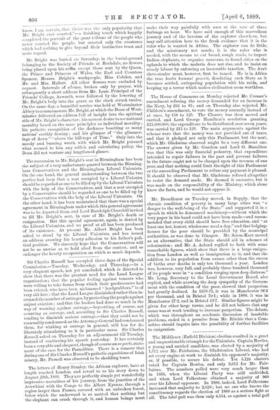Mr. Broadhurst on Tuesday moved, in Supply, that the chronic
condition of poverty in many large cities was " a danger to the well-being of the State," and supported it in a speech in which he denounced machinery—without which the very paper in his hand could not have been made—and recom- mended that every child should have free education, and " at least one hot, honest, wholesome meal a day," and that lodging- houses for the poor should be provided by the municipal authorities, as was done in Glasgow. Mr. Seton-Karr moved as an alternative, that the State should aid in schemes of colonisation ; and Mr. A. Adana replied to both with some remarkable figures, which show that there is a large emigra- tion from London as well as immigration to it, and that the addition to its population from causes other than the excess of births over deaths is only ten thousand a year. London was, however, very full, and probably three hundred thousand of its people were in " a condition verging upon deep distress." Mr. Long, Secretary to the Local Government Board, also replied, and while avowing the deep sympathy of the Govern- ment with the condition of the poor, showed that pauperism had greatly declined. In 1870-71, it was in Manchester 56.2 per thousand, and in Bristol 70.1; while in 1889, it was in Manchester 27.2, and in Bristol 53.7. Similar figures might be given for other large towns, and he did not believe that any cause was at work tending to increase pauperism. The debate, which was throughout an academic discussion of insoluble problems, ended in a promise from Mr. Ritchie that a Com- mittee should inquire into the possibility of further facilities to emigration.


































 Previous page
Previous page